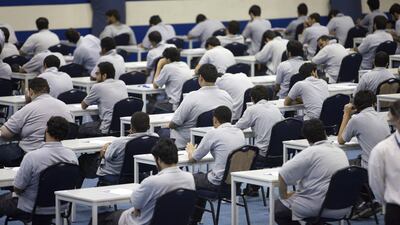DUBAI // Cultural, family and societal pressures to earn high grades can lead some children to feel shame or anxiety and lose self-esteem if those standards are not met, experts warn.
With hundreds of pupils nationwide set to learn their A-Level results next week and GCSEs the week after, experts said parents and schools could do more to support children facing pressure during exam periods.
Nayla Daou, clinical psychologist and founder of Clear Minds Centre for Emotional Health in Dubai, said schools and parents must be more aware of the stress on children.
“Obviously it depends on an individual child, and some are more able to deal with exam stress than others. It also depends on what type of testing the school is doing,” she said.
A pupil with emotional issues may be more susceptible to exam stress, she said. Cultural aspects could also play a role in families’ pressure on children.
The effects of exam stress could manifest in different ways, such as anxiety or eating disorders.
“It completely depends on the child and some may become more withdrawn and give up, and others might put more pressure on themselves,” Ms Daou said.
UAE pupils face regular testing at the end of the term or school year for their particular curriculum, and various age groups take international benchmarking tests such as the Programme for International Student Assessment and Trends in International Mathematics and Science Study, every three and four years, respectively.
Rema Menon, founder of Counselling Point in Dubai, said children were confronted with exam pressures from parents and schools, and as part of wider societal expectations.
“The academic expectation can be from trying to get places into high-level institutions such as Ivy League colleges, which demand a very good exam results,” Ms Menon said.
“Some schools tell their pupils that they must get high grades in tests as their future depends on it, because the school itself is judged on how good their exam results were.
“In the UAE there is a trend of placing adverts in newspapers with the students who have got the highest grades. Parents of other children see those as do other pupils and, although it’s good for those featured, it can place more pressure on students to be successful.”
Pupils who do not meet these expectations can feel a sense of shame and dejection, and lose self-esteem, she said.
“Schools, parents and society in general should tell children that exam results are not the be-all, end-all of life, and there are opportunities even if they do not get the grades to go to their first-choice university.”
Ms Menon advised pupils going through a difficult period to take stock of their situation.
“They need to see whether the stress is academically based or due to something else,” she said. “Is their time management balanced? Are they spending too much time on one subject and neglecting others or have they taken on a course that is too challenging for them?”
Brendon Fulton, principal at Dubai British School, said exam pressure was a huge factor for most teenagers but that the school tried to mitigate the difficulties.
Assessment during terms gradually introduce the formal exam process during non-exam years, and the exam office provides extra support to children “at risk” of being burdened by exam pressure.
There were targeted study and exam skills lessons during school aimed to ensure pupils were equipped with coping and self-management techniques, he said.
“However, some students may still find the process overwhelming. Therefore, during the exam process we conduct regular reviews and reflections to determine whether any students are struggling with the pressure, and we put in place any measures necessary to support them.
“This is normally done jointly with the family.”
nhanif@thenational.ae

